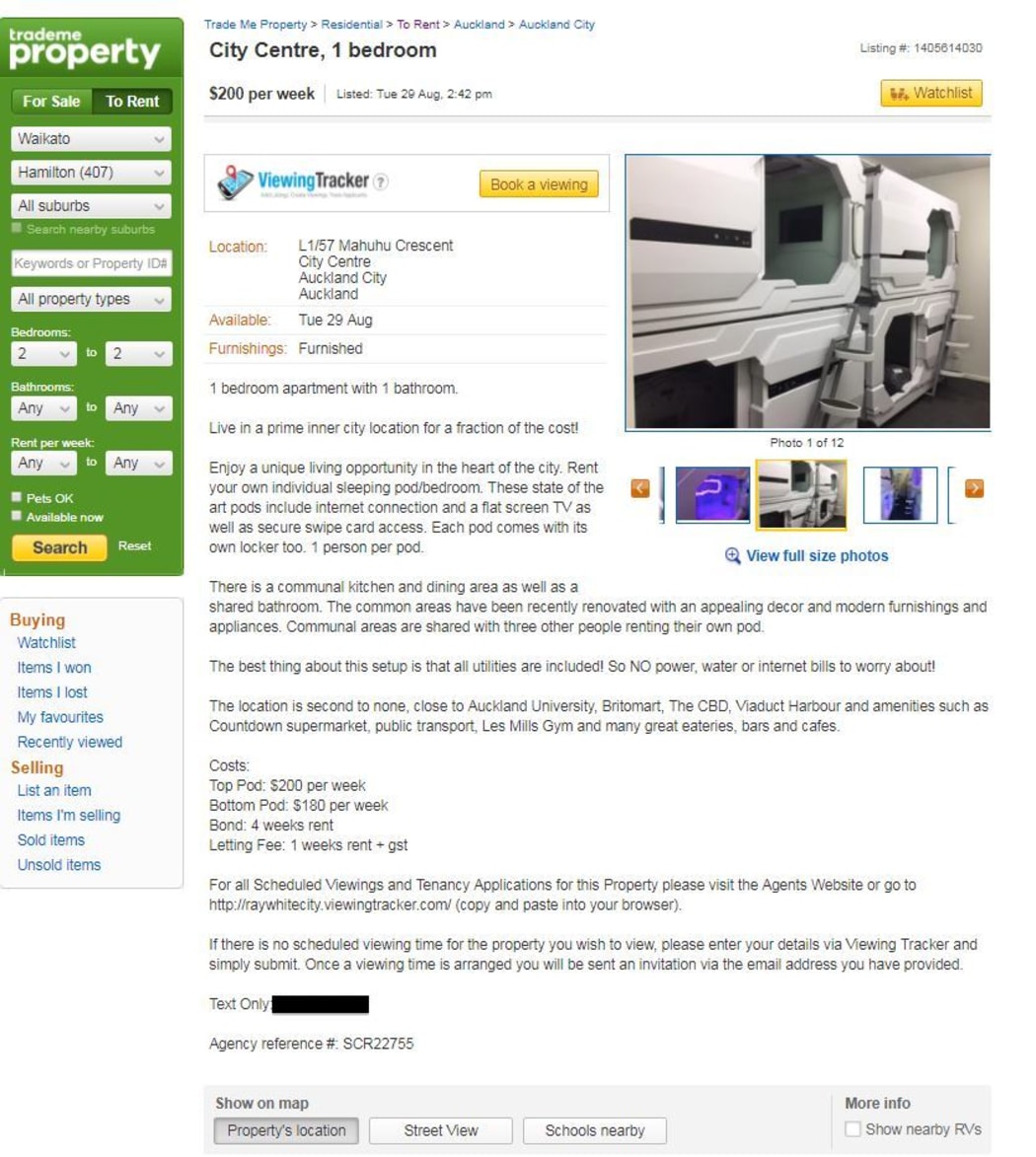An Auckland real estate agency renting tiny pods as “one bedroom apartments” for $200-a-week has removed the ad from Trade Me.

The sleeping capsule advertised for rent on Trade Me looked similar to this pod for sale on alibaba.com Photo: alibaba.com.
Yesterday, an agency advertised the $200-a-week sleeping pods as Auckland central apartments.
The ad showed photos of eight small “state of the art” capsules stacked two-high, with step access and violet coloured lighting.
Prospective tenants were encouraged to rent the pods, and share a kitchen and living space with other pod-tenants.
But the Trade Me listing for the capsules, which had been viewed more than 2000 times, was taken down within hours of being put up.
An agent for the company that listed the rental pods would not say why the ad was removed.
Auckland Council is looking into the legality of renting out the pods.
A spokeswoman called situation "unusual" and one the council had not encountered before.
"With that in mind, we will investigate this further to determine whether the pods, and how they were being advertised, breach any Building Code, resource consent or Auckland Unitary Plan rules," the spokeswoman said.
Advertised under the heading “City centre, 1 bedroom”, each pod appeared to contain a single mattress, a pillow, a fire hydrant, and a mirror.
Reminiscent of Japan’s famous capsule hotels, the pods were stacked two high - with the bottom pod advertised as costing $180 per week, and the top pod $200 a week.
“Live in a prime inner city location for a fraction of the cost!,” The Trade Me ad read.
“Enjoy a unique living opportunity in the heart of the city. Rent your own individual sleeping pod/bedroom. These state of the art pods include internet connection and a flat screen TV as well as secure swipe card access. Each pod comes with its own locker too.
“One person per pod.”
Tenants would have access to a living and kitchen space shared with three other pod renters, according to the ad, and utilities were included in the rent.

The capsules advertised on Trade Me Photo: screenshot TradeMe.co.nz
Yesterday, The Wireless called the advertiser, Ray White’s Supercity Rental Management Limited, to arrange a viewing.
But within half an hour the agent called back to say the ad had been removed and the viewing was cancelled.
Alan Johnson, a social policy analyst for The Salvation Army, said the appearance of the pods for rent showed if standards lowered enough, the market would provide anything.
“It’s a race to the bottom.”
Johnson said the pods might not be an unreasonable response to Auckland’s housing crisis, and some people, such as students, might like the accommodation.
But he wondered if the relatively cheap accommodation would appeal to vulnerable people desperate not to end up on the streets - such as those with drug, alcohol and or mental health problems - and if so, how they would cope with the lack of privacy.
“The people managing [the property] will have to be mindful of the people they’re letting in. Commercial operators have no interest in or knowledge of how to manage these people,” Johnson said.
Hugh Pavletich, co-founder of the Demographia International Housing Affordability Surveys, said the appearance of these pods to rent was symptomatic of Auckland’s over-inflated housing market.
Auckland housing now cost 10 times household income, Pavletich said.
“This is further evidence of how ridiculous the Auckland housing situation has got. When this government came in in 2008, Auckland housing was 6.4 times household income. When Nick Smith was appointed in early 2013 it was 6.7 times household incomes. Today it is 10 times.
“We’re going to see these nonsense solutions, when what we need to see desperately is actual affordable housing being built.”
In January 2010, the New York Times reported that Tokyo’s Capsule Hotel Shinjuku’s 510 capsules had become popular living spaces for those affected by the country’s recession.
Is it a boarding house?
According to the Ministry for Business, Innovation and Employment (MBIE), a boarding house is a situation in which a tenant rents a room, rather than a whole house. Facilities like the kitchen and bathroom are shared with other tenants, and the house is occupied by at least six tenants at a time.
However, according to the ad for the pods on Trade Me, only three tenants would share a communal space.
Under Auckland Council’s 2008 hostels bylaw, a boarding house is shared by five or more tenants. According to the bylaw, if a room is smaller than 4.5 square metres, it cannot be rented to sleep a person.
In a 1999 report by the Mental Health Commission (now the Health and Disability Commissioner), boarding houses were noted as filling a gap when there was an absence of other suitable accommodation, or where public sector housing provision was lacking.
“Often, they provide ‘housing of last resort’ for some consumers, while for some others they are a positive choice,” the report stated.
According to MBIE, if the owner of the premises lived on the property, rented out pods to individuals and shared facilities, then this arrangement will likely be excluded from the Residential Tenancies Act and was likely to be deemed a "flatmate” type arrangement.
What are pods?
Pods, or capsules are extremely small "rooms" intended to provide cheap, basic accommodation, made famous in Japan where the first capsule hotel opened in 1979.
The pods advertised as central Auckland apartments look very similar to a model advertised for sale on alibaba.com for US$600 each (for a minimum of six capsules). These pods are just over seven cubic metres.


